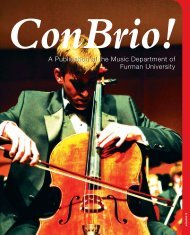Download - Furman University
Download - Furman University
Download - Furman University
- No tags were found...
Create successful ePaper yourself
Turn your PDF publications into a flip-book with our unique Google optimized e-Paper software.
In regard to the details of that fateful night eight decades ago,we may never learn how much is legend and how much is fact.According to Pete, his father, along withseveral teammates and a group of girls, had goneto Paris Mountain on a Saturday night to celebratethe 1933 season. Pete isn’t sure about thetiming; he thinks it was around Christmas.A quick historical check shows that Prohibitionended December 5, 1933, so they might well havebeen celebrating more than the football season.The players and girls were up on the mountain,far away from the downtown campus,drinking “corn liquor” and having a good time.It just so happened that two <strong>Furman</strong> professorswere also on the mountain — coon hunting.Their dogs sniffed out the revelers, and beforelong the professors followed the dogs into themiddle of the party. The professors said theyliked the boys and wished they didn’t have toreport what they had seen to <strong>Furman</strong>’s president,Bennette E. Geer, but they had no choice.It was time to go.What happened next may well have ledto the severity of the punishment.“My Dad said since they knew they weregoing to be expelled anyway and they didn’twant to waste the rest of the night, they tiedthe professors to a tree and went on with theirpartying,” Pete says. “They untied them and letthem go the next morning.”To put such an event into perspective, it’simportant to remember what sort of school<strong>Furman</strong> was at the time. Chapel was mandatory.Dancing wasn’t allowed on campus. And in astraw poll taken by The Hornet in October 1933,the student bodies of both <strong>Furman</strong> and GreenvilleWoman’s College voted “overwhelmingly”against the repeal of Prohibition.When the miscreants made the long walk tothe president’s office, President Geer, accordingto Blake’s account, delivered a stern lecture thatwent something like this: “If you boys had goneout by yourselves on the bank of the [Reedy] riverand loaded up, I would have given you a severelecture and let it go at that. But you’ve made apublic spectacle of yourselves and brought yourcollege into disrepute. I’ll have to expel you.”The chastened players accepted their punishmentsand went home. Geer made no promisesthat they could return, but he quietly askedprominent alumni in the boys’ hometowns tomonitor their behavior to see if they learnedanything from their expulsions.Daddy Dorn returned to Greenwood,where he lived with his sister, Lila. He hadgrown up on a farm in Saluda but moved hissophomore year in high school so he could attendGreenwood High. He had never played footballbefore, but he went out for the team and madean immediate impression on the coaches.According to Pete Dorn, his father’s firstpractice came in August, and he was the onlyplayer who didn’t complain about the stiflingGreenwood heat or had to crawl to the sidelinesto recuperate. “After working on the farm all hislife, he said practicing football was the easiestwork he had ever been involved in,” Pete says.And it was at that first practice that DraytonDorn picked up his nickname. The coaches werelooking for a punter, and Dorn said, “Give theball to Daddy and he’ll show you how to punt.”He booted the ball some 50 yards downfield,and the nickname stuck.Dorn wanted to go to South Carolina aftergraduation but wasn’t offered a scholarship.Clemson wanted him, but it was a military schoolat the time and Dorn made it clear he was notinterested in attending a military college. Thenhe was contacted by Clemson assistant FrankHoward, who would later become the school’slegendary head coach.“Howard told him not to worry, that hewouldn’t have to stay in the barracks,” Pete says.“He could stay in the local YMCA in Clemsonand just play football.”So Dorn went to Clemson. But despite whathe’d been promised, he spent his first week inthe barracks — which proved to be quite enough.He called Dizzy McLeod and said he’d like tocome to <strong>Furman</strong>. “Dizzy drove over, picked himup, and took him back to <strong>Furman</strong>,” Pete says.Daddy’s mother hardly missed a game duringhis career at <strong>Furman</strong>, but his father watched onegame and swore never to attend another. “I’m notgoing to watch a bunch of boys beat up on eachother like that,” he told the family. “I wouldn’tgo out on that field unless I had some knivesand guns to protect me.”By all accounts, though, opposing playerswere the ones who needed protection. <strong>Furman</strong>All-America end Bob King called Dorn “oneof the greatest tackles in the U.S.,” and theBonhomie likened Dorn’s play to “a wild bullin a China shop.”In the end, loyalty was one of Daddy’s traitsas well. Even though he would have beenwelcomed at Clemson or South Carolina hadhe decided his exile from <strong>Furman</strong> was too greata punishment, he accepted his fate in hopesthat he might be allowed to return.“He loved <strong>Furman</strong>,” Pete says. “It neverentered his mind to transfer to another school.”Of course, there was a happy ending.Daddy and his friends evidently lived exemplarylives during their year away from campus,and Geer allowed them to return to school.As a result, the 1935 football season wasa great one. The team went 8-1 with victoriesover Wake Forest, Clemson and USC, andwas once again state champion.At the football banquet, Dorn received theSportsmanship Trophy and Hardrock Smithwas named the Most Valuable Player. Accordingto the column written by Blake, the <strong>Furman</strong>president and the two honorees had tears intheir eyes as the awards were presented.Key figures in the tale, from left: “Hardrock” Smith, Trask McCarson,President Geer and Dizzy McLeod.“You are real men,” Blake quoted Geer assaying. “I am proud of you. Your school is proudof you.” There must have been tears all around,because Blake wrote that “this hard-boiled oldsports editor had to dry a little himself.”Dorn, who died in 1980 at the age of 68,would ultimately find his way to the <strong>Furman</strong>Athletic Hall of Fame, as would fellow conspiratorTrask McCarson. It is worth notingthat <strong>Furman</strong> never lost to Clemson or SouthCarolina when Dorn was in uniform. Andhis memory lives on at <strong>Furman</strong> in the formof the P.D. “Daddy” Dorn Endowed FootballScholarship, established by Pete Dorn andhis wife, Susan.As for the details of that fateful night onParis Mountain eight decades ago, we maynever learn how much is legend and how muchis fact. But knowing his father, Pete says, thestory doesn’t sound far-fetched to him.“My Dad was extremely popular when hewas in school,” Pete says. “He was a ladies’man, he was a prankster, and he enjoyed hisliquor until the day he died. His night onParis Mountain might be exaggerated a littlebit, but probably not much.” |F|Opposite: Images courtesy <strong>Furman</strong> SpecialCollections and Archives/Digicenter. Otherimages from Bonhomies of mid-1930s.4 FURMAN | SPRING 2013FURMAN | SPRING 2013 5



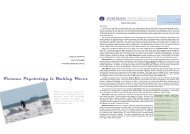
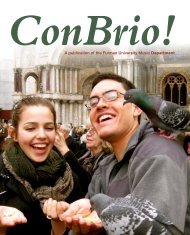
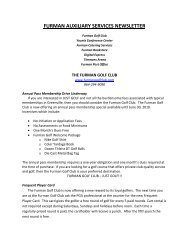
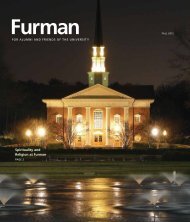

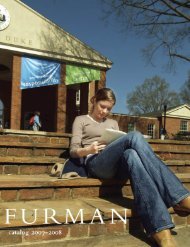
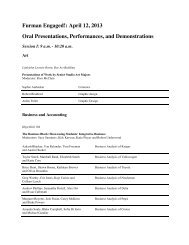

![Guidelines [PDF] - Furman University](https://img.yumpu.com/43814619/1/190x245/guidelines-pdf-furman-university.jpg?quality=85)
